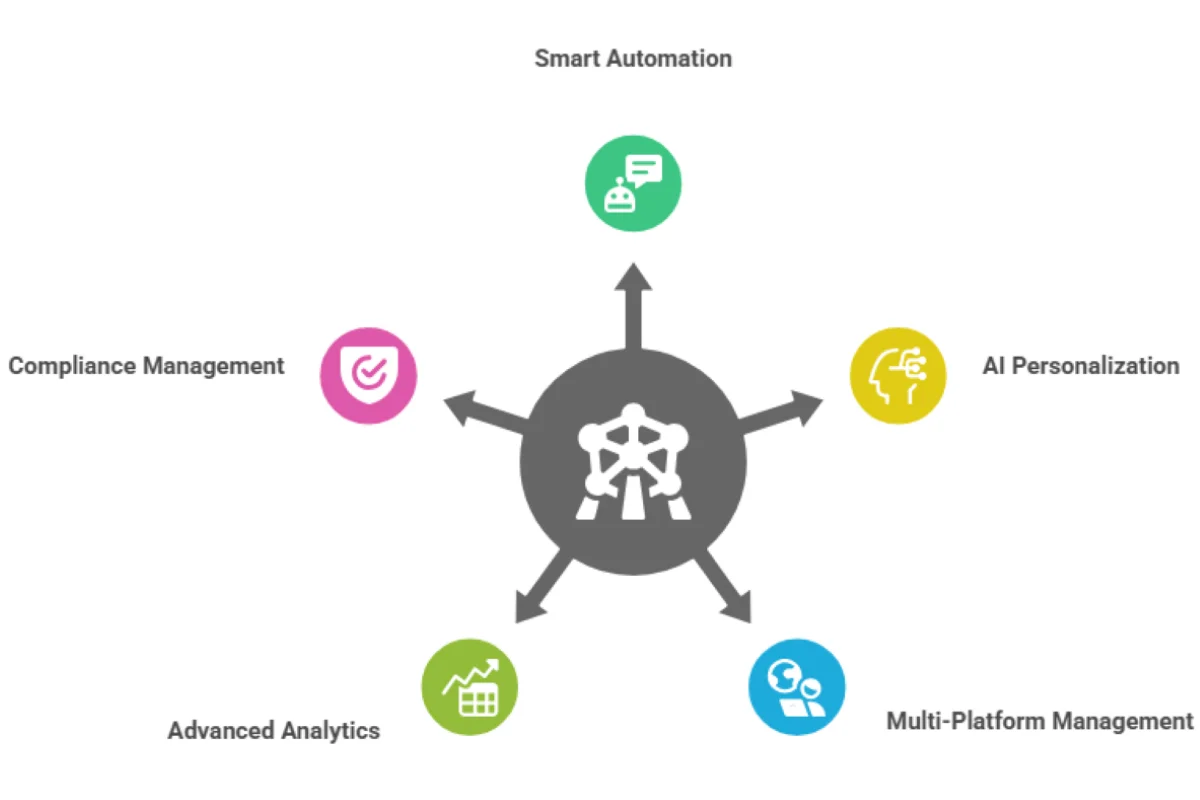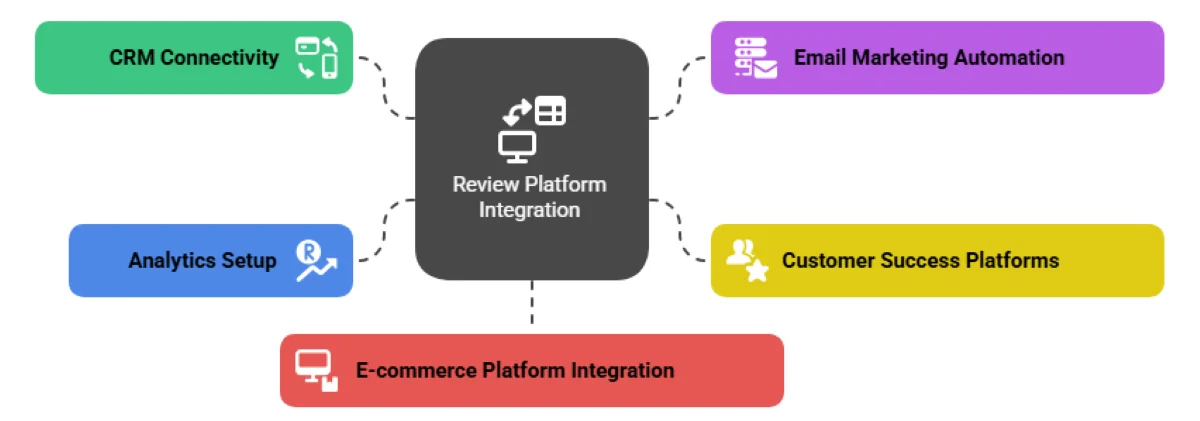
Customer satisfaction alone no longer drives business growth in today’s competitive marketplace. Businesses need active brand advocates who voluntarily promote products and services to their networks. The transformation from passive satisfaction to vocal advocacy requires strategic intervention at precisely the right moments in the customer journey. The best review generation software can help capture and amplify those moments into powerful public endorsements.
Research demonstrates that 47% of consumers trust customer testimonials and peer reviews when shopping on social media, while broader data shows 84% of people trust online reviews as much as a personal recommendation. This transformation from individual personal networks to digital advocacy platforms represents the fundamental shift in how purchasing decisions occur across industries.

The psychology of converting customers into advocates
Understanding customer advocacy requires recognizing the psychological triggers that motivate individuals to voluntarily promote brands to their networks. Successful review generation leverages specific behavioral patterns and emotional responses that distinguish advocates from passive, satisfied customers.
What motivates customers to recommend brands
Reciprocity psychology is the human instinct to return kindness when receiving help, and it drives advocacy. When businesses show genuine care for customer success beyond the transaction, customers respond by advocating after experiencing unexpected value, superior service recovery, or personalized attention that exceeds baseline expectations.
Optimal timing for review requests
Research indicates that request timing significantly impacts response rates. Industry best practices suggest sending review requests when customer satisfaction is at its peak – typically after successful service delivery, positive customer service interactions, or milestone achievements in the customer journey. Studies show that consumers spend an average of 13 minutes and 45 seconds reading 10 online reviews before trusting a local business.
The reciprocity principle in action
When companies provide additional value, educational content, or unexpected benefits, customers naturally feel compelled to reciprocate through positive reviews and recommendations, creating sustainable advocacy cycles.
Essential features for advocacy-driven review tools

Modern review generation platforms require sophisticated capabilities beyond basic review requests to systematically convert satisfied customers into vocal advocates. Organizations must evaluate platforms based on advanced automation, personalization, and analytics capabilities.
Smart automation
Advanced platforms monitor customer behavior patterns, engagement metrics, and satisfaction indicators to automatically trigger personalized review requests at optimal moments throughout the customer journey.
AI personalization
Machine learning algorithms analyze customer communication preferences, purchase history, and interaction patterns to craft personalized review requests that resonate with individual customer motivations and communication styles.
Multi-platform management
Comprehensive platforms enable simultaneous review campaign management across multiple review platforms, ensuring broad visibility while maintaining consistent messaging and brand representation across channels.
Advanced analytics
Sophisticated analytics capabilities track review generation ROI, customer lifetime value impact, and advocacy scoring systems that identify customers most likely to become brand advocates.
Compliance management
Enterprise-grade platforms include built-in compliance monitoring for industry-specific regulations, ensuring review generation practices meet legal requirements and maintain ethical standards across all campaigns.
The role of AI in modern review generation
Artificial intelligence revolutionizes review generation by enabling predictive analytics, personalized timing, and dynamic optimization that dramatically improve advocacy conversion rates compared to traditional manual approaches.
Predictive advocacy scoring
Machine learning algorithms analyze customer data, purchase patterns, and engagement metrics to assign advocacy scores, enabling businesses to prioritize outreach to customers most likely to provide positive reviews.
Optimal timing algorithms
AI systems continuously analyze response patterns, customer behavior data, and industry benchmarks to determine the precise timing for review requests that maximizes response rates and review quality.
Automated personalization
Advanced platforms utilize natural language processing to create personalized review requests that match individual customer communication preferences, purchase history, and demonstrated satisfaction levels.
Sentiment-based optimization
Real-time sentiment analysis monitors customer interactions and feedback to automatically adjust review request timing, messaging, and channel selection based on current customer sentiment and satisfaction indicators.
Dynamic campaign optimization
AI-powered platforms continuously test and optimize review generation campaigns, automatically adjusting messaging, timing, and targeting parameters to improve advocacy conversion rates over time.
Leading review generation platforms for 2025
Modern enterprises require sophisticated platforms that integrate advanced automation, artificial intelligence, and comprehensive analytics to systematically convert satisfied customers into vocal brand advocates.
This analysis examines the leading review generation platforms based on advocacy conversion capabilities, enterprise features, and measurable business outcomes.
| Platform | Starting Price | Key Strengths | Best For | Advocacy Features |
| Spreadical | $39/month | Advanced analytics, advocacy scoring, and AI automation | Solo businesses to enterprise brands | Predictive advocacy identification, conversion tracking, and smart sentiment analysis |
| Birdeye | $300+/month | Comprehensive CX platform, 200+ sites, AI-powered automation | Multi-location enterprises | AI-powered referral automation, sentiment analysis, and comprehensive reputation management |
| Podium | Custom pricing | AI-powered automation, 24/7 support, SMS-focused communication | Large enterprises, automotive/retail | Advanced AI lead conversion, real-time engagement, and video chat integration |
| ReviewTrackers | $49+/month | 120+ review sites, enterprise analytics, competitive insights | Large businesses, service industries | Sentiment analysis, competitive benchmarking, and advanced reporting |
| NiceJob | $75/month | Set-and-forget automation, social sharing, website integration | Small to medium businesses | Automated social media amplification, customer story creation |
| SocialPilot Reviews | Free tier available | Cost-effective, essential features, and social media integration | Small businesses, startups | Basic automation, multi-platform posting, and affordable pricing |
| ReviewArm | Pay-as-you-grow | Flexible pricing, no contracts, AI-powered responses | Growing businesses | AI-powered responses, scalable automation, digital review cards |
| Reviewflowz | $29/month | NPS integration, reward systems, Slack integration | Service businesses, B2B companies | Advocacy scoring, loyalty integration, and real-time notifications |
Industry-aligned methods for optimizing customer feedback
Different industries require tailored approaches to review generation and advocacy conversion based on customer behavior patterns, regulatory requirements, and purchase decision factors specific to each sector.
E-commerce
E-commerce businesses achieve optimal results by implementing automated review requests following delivery confirmation, utilizing product-specific messaging that addresses purchase satisfaction and encourages detailed feedback about product quality and shipping experience.
Software-as-a-service (SaaS)
Software companies maximize advocacy by triggering review requests during positive milestone moments such as successful onboarding completion, feature adoption achievements, or renewal confirmations when customer satisfaction peaks.
Healthcare
Healthcare providers must navigate HIPAA compliance requirements while implementing review generation strategies that focus on service quality, facility cleanliness, and staff professionalism without compromising patient privacy or confidentiality.
Local services
Service-based businesses leverage geographic targeting and community connections to encourage reviews that highlight local expertise, reliability, and community involvement to build strong local reputation foundations.
Professional services
Consulting firms, law practices, and financial services benefit from personalized outreach strategies that acknowledge long-term client relationships and emphasize professional expertise and results-driven outcomes.
Connecting review platforms to enterprise workflows

Successful review generation implementation requires seamless integration with existing business systems to automate data flow, trigger campaigns based on customer behavior, and measure advocacy impact across the entire customer lifecycle.
CRM connectivity
Advanced platforms integrate with Salesforce, HubSpot, and other CRM systems to automatically sync customer data, track review generation campaigns, and measure advocacy impact on sales pipeline progression and customer lifetime value.
Email marketing automation
Integration with platforms like Mailchimp, Constant Contact, and Marketo enables coordinated review request campaigns that align with broader email marketing strategies while avoiding customer communication fatigue.
Customer success platforms
Connections with tools like Gainsight and ChurnZero enable review requests to be triggered by positive customer health scores, successful milestone achievements, and satisfaction survey responses indicating advocacy potential.
Analytics setup
Comprehensive tracking requires integration with Google Analytics, customer data platforms, and business intelligence tools to measure review generation ROI, advocacy conversion rates, and long-term business impact.
E-commerce platform integration
Direct connections with Shopify, WooCommerce, and other e-commerce platforms enable automated post-purchase review campaigns triggered by delivery confirmations and customer behavior patterns indicating satisfaction.
Regulatory standards for review generation practices
Review generation programs must adhere to platform policies, industry regulations, and ethical standards to maintain credibility while building sustainable advocacy programs that protect both businesses and customers.
Platform policy adherence
Google, Yelp, and other review platforms strictly prohibit incentivized reviews, fake feedback, and manipulation attempts, requiring businesses to implement authentic review generation practices that comply with terms of service.
Industry-specific regulations
Healthcare organizations must comply with HIPAA requirements, financial services face SEC regulations, and other industries have specific guidelines governing customer communication and feedback collection practices.
Ethical review practices
Sustainable advocacy requires transparent communication about review requests, genuine customer experiences, and authentic feedback collection that builds trust rather than manipulating perception through artificial means.
FTC compliance requirements
Federal Trade Commission guidelines require clear disclosure of any incentives, honest representation of customer experiences, and truthful advertising practices in all review generation and marketing communications.
Data privacy protection
Review generation platforms must implement GDPR compliance, secure data handling practices, and customer privacy protection measures that maintain trust while collecting and managing customer feedback data.
Quantifying the impact of review generation

Effective review generation programs require comprehensive measurement frameworks that track advocacy conversion rates, business impact, and long-term value creation from customer advocacy initiatives.
Advocacy conversion metrics
Track the percentage of satisfied customers who become active advocates, measuring progression from review completion to active referral generation and social media promotion activities.
Revenue impact analysis
Measure direct revenue attribution from advocacy-driven leads, calculate customer lifetime value increases from positive reviews, and quantify new customer acquisition costs reduction through authentic peer recommendations.
Reputation score improvements
Monitor average review ratings across platforms, track review volume growth rates, and measure sentiment analysis improvements over time to assess overall reputation enhancement outcomes.
Customer retention correlation
Analyze relationships between review participation and customer retention rates, identifying how advocacy activities correlate with increased loyalty, reduced churn, and enhanced customer lifetime value.
Competitive advantage measurement
Compare review generation performance against industry benchmarks and direct competitors, measuring market share gains and customer preference shifts attributable to enhanced online reputation.

Frequently asked questions:
What is review generation software, and how does it work?
Review generation software automates the process of requesting, collecting, and managing customer reviews across multiple platforms. These systems integrate with business operations to trigger review requests at optimal moments, personalize messaging based on customer data, and streamline response management to maximize positive feedback collection.
How does AI improve review generation results?
Artificial intelligence enhances review generation by predicting customer advocacy likelihood, optimizing request timing, personalizing messaging content, and analyzing sentiment patterns. AI algorithms continuously learn from response data to improve campaign effectiveness and identify the most promising advocacy opportunities for maximum conversion rates.
Which platforms integrate with Google and Yelp?
Most enterprise-grade review generation platforms offer native integrations with Google Business Profile and Yelp, including comprehensive monitoring, response management, and campaign tracking capabilities. These integrations enable automated review collection and comprehensive reputation management across multiple review platforms.
What’s the average cost of review generation software?
Pricing varies significantly based on features and business size, ranging from free basic plans to $600+ monthly for enterprise solutions. Most platforms offer tiered pricing with basic plans starting around $39-49/month and comprehensive enterprise solutions requiring custom pricing based on specific business needs.
How do you identify customers most likely to become advocates?
Advanced platforms use predictive analytics to score advocacy potential based on purchase history, engagement metrics, satisfaction scores, and behavioral patterns. Machine learning algorithms analyze customer data to identify individuals most likely to provide positive reviews and generate referrals for sustainable business growth.
Can tools automate review requests via email and SMS?
Yes, modern review generation platforms support automated multichannel campaigns including email, SMS, and in-app notifications. These systems can trigger requests based on specific customer actions, time delays, or satisfaction thresholds to optimize response rates and review quality.
How do you measure ROI from review generation software?
ROI measurement includes tracking review volume increases, average rating improvements, new customer acquisition from reviews, customer lifetime value changes, and direct revenue attribution from advocacy-driven leads. Comprehensive analytics platforms provide detailed ROI dashboards with actionable insights for campaign optimization.
Are there industry-specific compliance requirements?
Yes, industries like healthcare (HIPAA), financial services (SEC regulations), and others have specific compliance requirements for customer communication and data handling. Leading platforms include built-in compliance features for regulated industries to ensure ethical and legal review generation practices.
What’s the difference between review generation and management?
Review generation focuses on actively requesting and collecting new reviews from customers through automated campaigns and personalized outreach. Review management involves monitoring, responding to, and analyzing existing reviews across platforms. Comprehensive platforms combine both capabilities for complete reputation management solutions.
Which platform offers the best customer support?
Support quality varies by pricing tier and platform focus, with enterprise plans typically including dedicated account management and priority assistance. Spreadical provides AI-powered automated responses with WhatsApp integration, while platforms like Birdeye offer dedicated account managers for higher-tier plans. Most platforms offer email support for basic plans and enhanced support for premium tiers.


